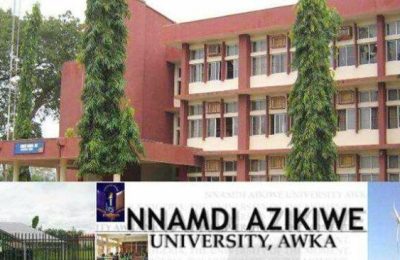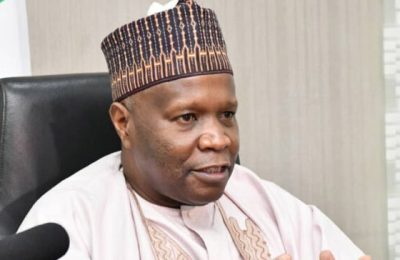GBELEBU is a village in Ovia South-West Local Government Area of Edo State. It is a 100 percent Ijaw enclave. How such a community was delineated to be part of Edo, only God knows. Interestingly, the origin of Gbelebu is Arogbo Ijaw in the present Ese-Odo Local Government Area of Ondo State. Gbelebu’s brothers are also scattered in Ovia North-East Local Government Area, also in Edo State and other Ijaw towns and villages in Delta and Bayelsa States. I was in that agrarian village last weekend for the funeral rites of High Chief Aaron Ponuwei Ebelo, the Okito of Gbaraun Kingdom; and father of my university classmate, Goodluck Ilajufi Ebelo. Two of our classmates, a professor and current Head of Department (HOD), English Language, Obafemi Awolowo University, Ile-Ife, Professor Dipo Babalola, and Fidelis Soriwei, another Ijaw son and cousin to Goodluck, also attended the ceremony. My first line-editor in the journalism profession, Ikechukwu Amaechi, and the General Editor, Nigerian Tribune, Taiwo Adisa, graced the occasion. It was a carnival of sorts. The Ijaw nation demonstrated their unity when they filed out to dance. I was told that many of the people who attended the ceremony and who danced heartily never knew Pa Ebelo in his lifetime. They attended the funeral to show the solidarity and unity of Ijaw nation, and more importantly, to demonstrate that no matter what administrative convenience of boundary demarcation might have done, a people united in spirit cannot be separated. From Gbelebu, one can connect any part of the world through the sea. It is a place one wants to visit often and often because of the hospitality of the people. Yet it is a town one should not visit twice in a year! I will explain why it is so.
Christianity was introduced to the countryside in a very subtle way. At least that was what we grew up to know. The earlier ‘missionaries’ in my hometown, especially the ones we called SU (Scripture Union), came preaching without the present-day “fall-down-and-die” crusaders. I am not sure if they had started with the aggression that we see nowadays, anyone would have listened to them. Those early SUs used symbols a lot in their engagements. One of such symbols is the Cross. The Yoruba call it Agbelebu. Agbelebu assumed other meanings apart from the tree upon which Jesus Christ was crucified. The Cross, over the years, became a symbol of burden. Whenever something unexplainable, and most of the times, avoidable happens, my people refer to it as the victim’s Agbelebu. And we all carry one agbelebu or the other. For the Nigerian masses, their most visible agbelebu is bad leadership. Bad leadership breeds misgovernance which ultimately leads to the governed suffering untold hardship. So, for years, the masses have been carrying on their lean shoulders, the agbelebu of bad leadership without any help in sight. How far they will go before they finally buckle under the weight of the heavy burden, nobody can tell. Will there be a day when the people will resolve that enough is enough? The only answer that came to mind as I asked this question is ensconced in the saying that when a load is too heavy for the head or the shoulder, there is a place it should be placed. Where is that place? Our elders did not state. That itself is an oro sunukun (deep thought).
From Benin City or Okada Junction on the Benin-Lagos Expressway to Udo junction, where the journey takes one to Gbelebu, life is more abundant. The two-dimensional road may not be the best, but the journey, traversing the routes can be very pleasant. However, the punishment begins immediately you drive out of Udo to connect to the road that takes one to Gbelebu. That is where the agbelebu begins. There are many bad roads in Nigeria, no doubt. Udo-Gbelebu road is in a class of its own. No one who has ever been to that axis will ever believe that such a road exists in the 21st century Nigeria. As we meandered through the artificial hills and valleys created by erosion on the road, I began to wonder which sin the people living in that area committed to be subjected to that kind of punishment. Every vehicle we passed by, or which passed our vehicle, had one tale or the other to tell. I asked myself what our problem was or is for a people to be so neglected! The torture on that road is a clear representation of the torture the masses go through daily in the hands of the inorganic leadership that has ruled and ruined the nation. The real agbelebu of the South West is Ibadan Ife Ilesa Expressway, a federal government property. It is as ghastly as a fatal accident. But the minister of works, David Umahi, did not include it on a list of his priority roads released recently. What offence did the people of that area commit to warrant carrying that horror of a cross? What about the Benin-Owo-Akure Road? Akure-Ado Ekiti Road; Ikole-Omuo-Kabba Roads and many more are begging for attention. On those roads and many more across Nigeria, kidnappers and other felons are kings!

What worsens the situation for commuters on the Udo-Gbelebu road, especially the villagers, is the fact that there exists a shorter and better access road, but the people cannot use it, or are not allowed to use it. I asked why. Here is the explanation I got. A big oil palm company, Okomu Oil Palm PLC, has its plantations along that axis. The company, we learnt, a few years ago, claimed that its palm fruits were being harvested by thieves, and it devised a means of curtailing that. What did it do? It simply went and dug trenches across the road, a la Governor Yahaya Bello of Kogi State and the roads to Senator Natasha Apoti-Uduaghan’s constituency during the 2023 general elections. It never matters if there are indigenous people, whose ancestors used that same road before Okomu came to the locality. In fact, we were told that the road came into existence in the days of Western Region. The company, in crass impunity, simply cut off the road and every commuter is now forced to use the old farm road that was abandoned decades ago. Neither the Ovia South-West council, which is the primary host of Okomu Oil, nor the Edo State Government, has been able to come to the rescue of the people. While one is not averse to Okomu Oil securing its facilities and produce, adopting such a crude method and depriving the people the use of their heritage, beats every sensible imagination. By digging trenches across the road on the excuse that palm fruits were being stolen, and depriving the people access to the ancient road also shows that Okomu Oil thinks that an average villager in that locality is a thief! That is preposterous, at best! If the road had not been blocked by the giant oil palm company, we were told that the journey from Udo to Gbelebu would have been less than 45 minutes. We were punished on that road for more than two hours! How a company could take the laws into its hands without recourse to civilisation, and yet, the government looks the other way is something one cannot explain. For the two nights I spent in Gbelebu, I kept asking: how long will these people tarry before something will give?
Bad road is not the only agbelebu of Gbelebu people in the hands of the insensitive leaders they joined in putting in power at all levels of governance. We were by the riverside. I noticed that people just dipped empty water bottles into the river and drank the water directly. I drew the attention of Fidelis to the scene. His explanation was shocking. Pointing at the river, he told me that the water is so pure that it requires little purification to make it potable. Yet in the entire community and the ones we passed on our way to the village, there is no single pipe borne water tap. My mind did a simple arithmetic. If the water from the river at Gbelebu is as pure as I was told, how much would it cost the government to lay pipes into the river, and establish a treatment plant, from where the water can be channeled to the people? Probably a one-year “constituency project” cost of one ‘honourable’ member of the House of Assembly, or House of Representative, or the senator representing the area would have solved the problem. As we were approaching Gbelebu, we saw some locals carrying jerry cans of water on their heads, climbing laboriously, the steep hill that leads to their homes. Looking across the bad road, we saw some others having their bath in the same river! This will not go without pointing out that there is no single string electric wire in Gbelebu and the adjourning villages! Bear in mind, dear readers, that this year is 2023!
Just as Gbelebu residents and their neighbours are carrying their own portion of agbelebu of bad leadership, something new and “befitting” is about to happen to our Vice President, Dr Kashim Shettima, courtesy of Mr Nyesom Wike, the Minister of the Federal Capital Territory (FCT). Wike has proposed to construct a N15 billion “befitting residence” for the comfort of the vice president! Virtually all dailies published on Monday had the story on their front pages. Socio-Economic Rights and Accountability Project (SERAP), is kicking against the profligate spending, made an appeal to the Senate President, Godswill Akpabio, to use his leadership position “to promptly reject the plan.
I have no problem having a conducive environment for workers. Each time I enter either the remodeled state secretariat or the high court complex and other government offices in Benin City, Edo State, my mind gives kudos to Governor Godwin Obaseki for deeming it fit to make the workplace nice enough for the workers. I know that at a time, rats, we were told, chased General Muhammadu Buhari out of his office. Funny people! What is the state of the vice president’s quarters? How ‘unbefitting’ has the place become? I When was the entire Aso Rock Villa built such that in 2023, the vice president needs another “befitting residence?” Questions and questions!

The Prime Minister of the United Kingdom (UK) lives in 10 Downing Street. That edifice was built between 1862 and 1864. That is well over 300 years ago. Over the years, the UK Government had only carried out major renovations on the property three times – in 1960, 1980, and 1990. These renovations were done without any fundamental change in the original design as conceived by George Downing, the original owner and his architect, Christopher Wren.
The worst form of wickedness that can be visited on a people is to tear down their memory. In a country where many people live without potable water, electricity and the worst of roads, it amounts to sheer insensitivity and pathological wickedness for the leaders to think only about their comfort. The bad road which is the agbelebu of Gbelebu people is the same all over Nigeria. My pastor teaches me to always pray for our leaders. But I find it difficult to open my mouth and ask the heavens to shower mercies upon our leaders with the anguish I see on the streets daily. The urge to ask for the opposite upon the locusts ruining our vegetation became stronger after my Gbelebu trip. That is my feeling right now. My heart bleeds even as I wish High Chief Aaron Ponuwei Ebelo a peaceful rest in the bosom of the Lord!
READ ALSO FROM NIGERIAN TRIBUNE







